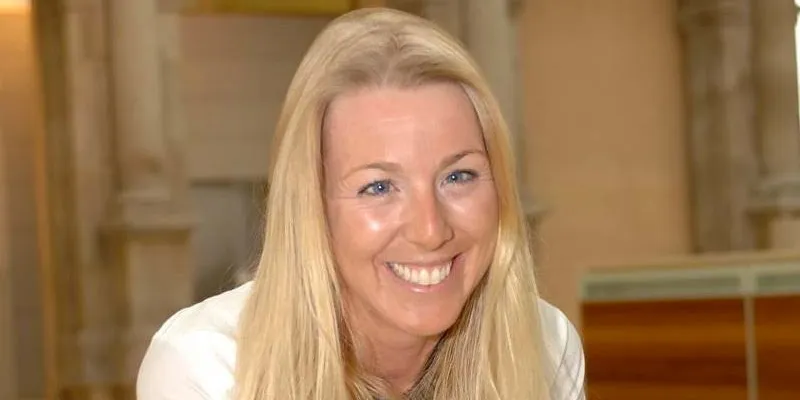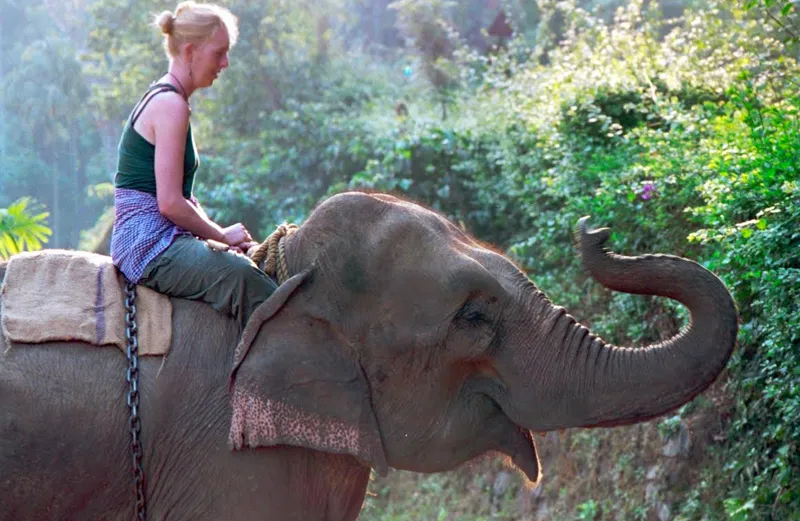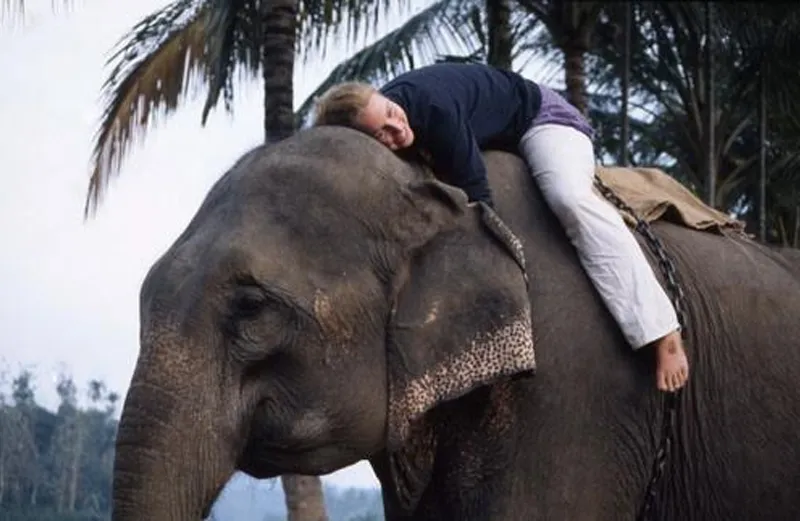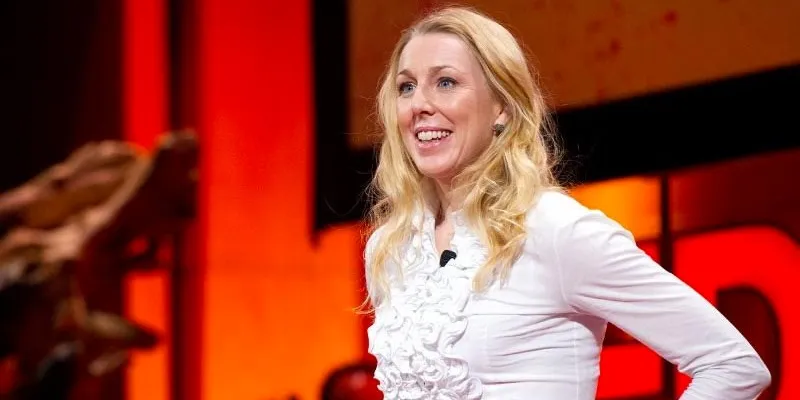A blind girl on an elephant travelled 1,000km across South India to prove disability can be a strength
Caroline Casey’s enduring childhood dream was to become Mowgli from The Jungle Book. But as she grew older, she relegated that dream to the cobwebs of memory because an exciting adulthood beckoned. She had her bucket list all planned out. Topping that list was driving a motorcycle wearing a black leather jacket while speeding through the wind. It was when she wanted to apply for her driving licence that a shocking truth revealed itself- she was legally blind and thus barred from a number of activities including driving.
An elaborate game
Caroline’s parents were invested in granting her a childhood as free from labelling and prejudices as possible. So they invented an elaborate game that kept her from finding out the truth about her condition. Her sister, who’s three-and-a-half years younger than her, was born with vision impairment even worse than hers. “We have a genetic condition called ocular albinism. It usually occurs in one in 7,000 births. It was easy to get me to the doctor by encouraging me to support my little sister,” she explains. Throughout her childhood visits to the eye doctor were designed to be a game to her to accompany her sister, not knowing that the play-acting where she got her eyes checked was real treatment.

Caroline spent her childhood believing herself to be like everyone else. Her vision loss is so severe that it means she cannot see beyond a few inches from her eyes. But that was not a deterrent for the rough and tumble of children’s games and she grew up believing everyone’s field of vision was the same as hers. She says,
When I discovered I had this visual impairment, which was very quickly called a disability, I didn't want it. I was seventeen years old and wanted to get on with my life. I had seen how people with disability were treated and it wasn't a cool new label. I just wanted to be a normal kid. So I decided I wouldn't tell anybody about it and would go about living as I was before this discovery. I hid it for eleven years.
A 'normal' life
For the next decade she did exactly that. “I had a very magical twenties. I travelled a lot. I trained as an archaeologist. I went to business school and went on to work with one of the best consultancy firms in the world. I lived my life really full and really hard. But all the time I was concealing that I couldn't see very well. I was so concerned with how people would treat me differently if they knew that I had a sight problem. I thought it would stop me getting a job, falling in love or having friends. It was only when I was 28 and had been working with Accenture for two-and-a-half years that I had to come out of the closet regarding my disability,” she says.
The decision to not let disability hinder her life was easily made. Following through was, as Caroline puts it, “Bloody hard!” She adds, “I look like a fully visual person. Other people have a picture in their head of what a blind person looks like. It was confusing for them to accept me as one when I didn't fit that notion. The physical limitations of low vision are that I can't drive or cycle. I walk into doors. I start talking to strangers. I go to the gent’s toilet. I can't see the clothes I am putting on. I can't see the cutlery or my plate while sitting down to eat. When I am reading, I have to hold the book up to my nose. I can't read the signs at an airport. Sometimes I come across as rude because I am trying so hard to focus with my eyes that I end up ignoring people. The biggest challenge for me is exhaustion. I am always trying to see. The worst thing low vision has given me is extreme chronic back pain. When you have vision like this, you don't have great balance and are quite wobbly. So I have a tendency to fall. I fall under things, over things and into things a lot. With all the falling, my back has got damaged.”
Though her disability prevented her from being a biker chick, she went ahead and did the next best things. “The nearest thing I could find to that adventure was archaeology. So I studied as an archaeologist and read the classics. I love Greek and Roman history. Someone with my level of vision wasn't allowed to go on excavations. I then went travelling around the world with a great friend of mine. We went to Asia, Australia, Mexico and America. Those were adventures of a typical 21-year-old. I had saved up for some time to be able to go scuba diving, but again, someone with my eyesight was not permitted to do that. So I had to settle for snorkelling instead. I drove a truck for a few kilometres across the 'no board plane,' in Australia. It is a very straight road so I couldn't knock anything down. That was great,” she exclaims.
With her thirst for adventure temporarily fulfilled, it was time to decide on a vocation. “When I came back from Australia I still had that need to be outside. So I became a landscape gardener. Then I qualified as a masseuse because being a blind landscape gardener wasn't ideal. I began getting impatient so I decided to go back to college and study business. My father was an entrepreneur and I'd always been fascinated by business. In business school I was honest with my lecturers. I told them I needed to get extra slides. I got enlarged exam papers. By the time the masters exams came around, my vision loss was quite extreme so I answered them orally. After business school I interviewed at Accenture and got the job. But I didn't let them on about my eyesight at the time,” she recounts.
Caroline says that when she started at Accenture, she was quite a hippie and it was an interesting transition going from that into a suited, booted businesswoman. But it was a work hard and play hard kind of environment and she loved it. “A lot of my business principles and work ethics now come from what I learnt there,” she says. But her vision kept getting weaker and she could not continue working at the cut-throat standard she held herself to.
Hitting rock bottom
Thus came a major turning point in her life: “It was March in 2000. It's been sixteen years now, but I can still go back to that moment and tell you exactly how I felt then. I had to tell the HR at Accenture about my disability because my vision was getting weaker. They sent me to an eye specialist to find out how they could support me. Until that appointment a part of me had held on to the belief that this vision thing was just in my head. But in the appointment I found out that my vision loss was here to stay. The only thing I could control was the way I looked at things (excuse the pun) and that I had to take responsibility for myself. I had to learn to live completely as myself, not just as bits of myself.

“After that appointment I was so angry at how much my eyes had started to take over my life. I went for a run to process the news. This particular run that I go on, I had never fallen. That day I fell. I was heartbroken and angry and I didn't know how to get up from this rock that I had fallen on. I had hit rock bottom, literally.
“It wasn't just my sight. There were a lot of things shifting in my life and I didn't know what to do anymore. And then I started remembering all the things I loved to do because the doctor had asked me what I had wanted to be as a child and what my dreams were. He basically said there is nothing stopping me from doing what I want except myself. So it was on that rock on that awful day that I thought about doing what I wanted- which was to become Mowgli from The Jungle Book.
“One of my favourite books is Mark Shand's Travels On My Elephant. That day I got up from my rock, as I've come to call it, ran home and took that book off my bookshelf. I made a decision that day that I too would go to India, become a mahout and travel across the country on elephant back.”
Becoming Mowgli
The way Caroline tells it, making the decision was the hard part. Once she committed to it, everything else began to fall in place,
I got in touch with Mark Shand. He had got umpteen number of fan mails over the years and never really replied to anyone. But for some reason, he replied to my crazy idea. He recruited an extraordinary adventurer named Neeraj Pathania. Neeraj helped me map my journey and choose my elephant. My intention was only to rent an elephant. But the moment I saw Kanchi, I fell in love and knew she would be mine for good.
Caroline dedicated her journey to raise money for charity and ultimately was able to raise enough to pay for 600 cataract operations in a hospital in Coimbatore.
“I asked Accenture to give me a year off. They did and were the very first to give me money for the charity. I arrived in India on January 13, 2001. The first time my feet touched the soil on Calicut I remember thinking, 'This is the best moment of my life.' This was my adventure. I wasn't watching it in a film. I wasn't reading it in a book. I was creating my own reality,” she says.
Kanchi and I
Caroline remembers the moment she met Kanchi as if it was yesterday. “Kanchi is a funny elephant. She is not the easiest or the most loving. She is complex and complicated. I remember when I was walking towards her, she was swinging her trunk backwards and forward. Elephants have a habit of sucking up dust and putting it on their backs to keep them cool. As I started to walk towards her, she went dead still. The entire village had come out to watch this strange spectacle of a blonde girl approaching this massive elephant with all these cameras trailing her. As I walked up to her, we were both silent and looking at each other. I started crying because this was everything I had ever dreamed of. I touched my forehead to her trunk. I smelled bananas and muck and poo. The heat of her skin seeped into mine and I gave her my heart immediately.”

Caroline trained for months and worked hard to learn to become a mahout the traditional way. “From the north of Kerala we travelled through Karnataka and then went on to Tamil Nadu. We ended our journey in a temple in Coimbatore in mid-May because that's where we were paying for the eye operations. And can I tell you- the heat! It was killing. I was riding bareback.”
Funnily enough her lack of eyesight was the least of Caroline’s problems in India.
There was so much I had to do and learn and concentrate on that my preoccupation with my vision went out of my head. My mahout trainer was on the ground giving signals and speaking in Malayalam, not a world of which I could understand. I couldn't see his signals. Another problem was that I was a western woman riding bareback on an elephant, who is an embodiment of Ganesha. A lot of people had problems with that. Navigating situations like this was tricky. Trying to convince my trainers that I was capable, to break the stereotype of this weak-disabled person was the hardest thing I had to deal with.
Mission
Caroline maintains that the charity was a by-product of her adventure. The main goal of her quest was to prove her strength to herself. “I needed to prove to myself that I was more than a pair of bad eyes,” she says. When she went back to Ireland, she felt restless and ill at ease. She wanted to generate her newfound fame to create an impact around the discourse on disability, but was at a loss as to how to go about it. She also couldn’t see herself going back to Accenture. So far her efforts had centred on making sure her disability didn’t short change her life experiences. Now she realised she was going about it all wrong.
I had a disability, but so did a billion other people in the world. They were my family and they were my tribe and I had discriminated against them by discriminating against myself. I just wanted to try and see if there was some way we could change the way we understood disability. And, secondly, try and provide some form of solution for inclusion of people with disabilities. For me it was business. I've been sitting on that elephant and thinking about all this and I became totally obsessed with this one thing. There will never be an inclusive society without inclusive business.
So she set up a certification system that measures how inclusive businesses around the world are. “The Ability Awards is an inclusive business certification process. It ran in Ireland, then it went to Spain and now it's going to Singapore. Late last year we closed down the Irish part of the business to focus on its international growth. Though we are headquartered in Ireland, our team comes from all over the world. Our ambition has gone from Ireland and Spain to global and we hope to bring The Ability Awards to several key markets soon. Yes, I am very interested in India.
“We are poised at a collective tipping point to convert the Ability Awards programme into a global standard for inclusive business. My dream is to have every company in the world have certification that says they are inclusive. I don't think I'm going to leave the planet unless that is, in some way, on its way to being achieved,” Caroline says.
In a nutshell, Caroline describes the Ability Awards as a combination of marketing, manipulation and business methodology tool. It encompasses national campaigning, data collection and leadership. What that really means is it is a tool or accreditation system like fair trade or ISO. “What we do is identify the best business leadership around inclusiveness over several categories throughout private and public domains. We collect this data to prove that inclusive business works and to give case studies that other companies can follow. We identify the best business brands and leaders to be our greatest advocates, ambassadors and sales people to make that change happen. We work with the prime ministers and presidents of countries around the world because if you want to see national change happen then you got to work across governments and communities and media. So a huge part of it is campaigning and challenging perceptions of how disability is understood in the minds of the public as much as in the minds of the business,” she says.
Caroline wholeheartedly believes that inclusiveness in business, and society at large, is not simply a question of ethics. It makes sound financial sense. She says, “Nobody is doing it because it is cute or good. They're doing it because it is a good business opportunity. The economic arguments for being inclusive has three key returns for a business. One is return on your brand positioning. What does your brand stand for and how is it perceived and understood. Number two is attracting and retaining the best talent. We know that millennials insist that they spend their time and career with companies that are value-driven and stand for something. Thirdly, the 1.3 billion people who have a disability have a collective disposable income of $9 trillion dollars. This is access to a new market. People forget that those with disability are like any other people on the planet. We need to buy things like anybody else and we have family and friends. This is business-driven.”
Advice
It’s been a rollercoaster ride of successes and failures for Caroline up to this point, but she wouldn’t change a thing about the past. “The difference between now and many years ago is that everything is the right fit. Everything feels good. I am excited and happier than I've ever been before.” But she does stress on the fact that her failures have been important teachers. “Whenever I listened to my gut, I seemed to make the right decisions. As I grew in business and became unsure of my footing, I started listening to other people. My heart got cut out and my head started to do most of the decision-making and that lead to some really bad outcomes. I made both bad business and personal decisions. Disregarding the voice of my own gut and intuition has been my biggest failure. I started to think other people knew better than I did. It's not that they didn't have great things to say. But when you're a leader you have to take accountability for your own decision and they need to be your own. Not other people's. So what I learnt is to never hand your power away and the people you hire should have the same integrity that you have.”

Her parting words of advice reflect her hard-won and fierce sense of identity,
No failure, no life event, no physical condition and no illness... none of that defines you. You're not one label. You’re a million labels and a million different experiences. So what might feel like the most clueless and frightening time will pass. It all passes.







